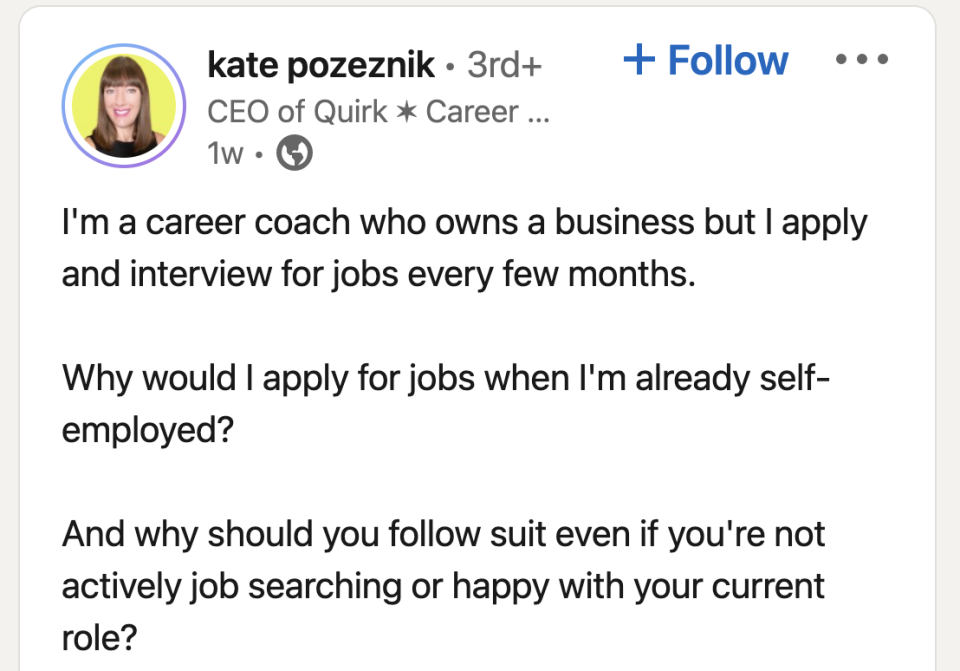"Career Cushioning" Is The Latest Work Trend, And People On LinkedIn Say It Can Help You Recession-Proof Your Paycheck
With tech layoffs in the headlines and economists still predicting a recession on the horizon, it's not surprising that many folks are rethinking their budgets and their careers right now. And over on LinkedIn, people are talking about something called "career cushioning."

LinkedIn Career expert Catherine Fisher defines it like this in her newsletter: "Career Cushioning is taking actions to keep your options open and cushioning for whatever comes next in the economy and job market. Think of it like an insurance policy to set yourself up for success."

Career cushioning differs from the traditional advice to work extra hard at your job in hopes of avoiding a layoff come recession time. Instead of trying to make themselves indispensable in their current roles, career cushioners are looking outside of their companies and low-key starting the search for their next jobs before they absolutely have to.
Paramount Plus / Via giphy.com
So what does that look like in practice? Fisher recommends three key steps. First, take stock of your skills and work on building any missing skills you'd need to land your next great job, pointing out that, "40% of companies on LinkedIn globally explicitly rely on skills to find the right job candidate." So make sure your skills are highlighted on your résumé and professional profiles, too.

Second, she suggests staying connected with your network, because you never know who might be looking to hire someone just like you for a great new role. And finally, make a plan for the next steps you want to take in your career.
CBC / Via giphy.com
Others advocate for career cushioning by actively applying for new jobs — even if you're happy in your current position. For example, Kate Pozeznik, CEO of Quirk, recently shared that she regularly applies for jobs despite being a business owner herself. She explains, "Given mass layoffs, economic uncertainty, and the rising number of dissatisfied employees, it's critical to be prepared for any eventuality. I know it sucks to hear that, but it's the reality. As a business owner, I'm not immune to market fluctuations either. That's one reason I apply for jobs and take interviews."

Of course, we all know that applying for jobs is easier said than done. So people like Khadyajah Jenkins, Technical Talent Scout at Adobe, are sharing tips that have helped them get through recent job searches. In a viral LinkedIn post, Jenkins says that in her latest job hunt, she created three different versions of her résumé and then tailored them to the roles she applied for.

And she also shared how she sought out companies that are known to treat employees well, writing, "Look at the Forbes 500 list and the list of best places to work. I wasn’t going to go from one bad workplace to another. (I’ve suffered ENOUGH)."

Lastly, she stood out in her search by sending notes to recruiters, directors, and hiring managers to show her interest in a new role. "LinkedIn premium gives you 80–100 connections. I crafted a note and sent connections out every Sunday." While this strategy didn't always yield as many responses, she says that those she did hear back from typically led to interviews.
But applying for a job is only half the battle — you also have to be able to interview well. Recently Justin Scott, Talent Partner at Adobe, shared the interviewing tips that helped him bounce back after a layoff, and they're great advice for anyone who's career cushioning too.

First, he says that preparation is key. "Be able to tell stories with information — don't just go in with your résumé and think you're going to pull up everything you've done on a whim. Practice talking about your experiences with a friend." Remember, even though some lucky, lucky people make it look natural, interviewing is a skill — so the more you practice, the better you can become.

Scott also suggests preparing data-driven answers to common interview questions to help you show the value you brought in your previous roles. "Find the data points and write at least five examples down. What was the situation, how did you notice it, what did you do to work with others to change it, and what was the result?"
Ultimately, career cushioning is about understanding that your current job won't last forever. The days of spending your whole career at the same company are waaay long gone, so why not get ahead of the game by planning for things to change?
NBC / Via giphy.com

